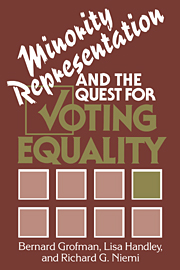Book contents
- Frontmatter
- Contents
- Acknowledgments
- List of Tables
- Introduction
- 1 The Right to Vote and the Right to Representation
- 2 The Evolution of a Vote Dilution Standard Through 1986
- 3 The Vote Dilution Standard in the Post-Gingles Era: Clarifications and Complications in the Lower Courts
- 4 Defining and Measuring Racially Polarized Voting and Other Elements of the Totality of the Circumstances
- 5 Vote Dilution in Single-Member Districts and Other Issues of the 1990s
- 6 The Voting Rights Act and the Realistic Politics of Second Best: An Optimistic Look to the Future
- Notes
- References
- Index of cases
- Index
Introduction
Published online by Cambridge University Press: 18 March 2010
- Frontmatter
- Contents
- Acknowledgments
- List of Tables
- Introduction
- 1 The Right to Vote and the Right to Representation
- 2 The Evolution of a Vote Dilution Standard Through 1986
- 3 The Vote Dilution Standard in the Post-Gingles Era: Clarifications and Complications in the Lower Courts
- 4 Defining and Measuring Racially Polarized Voting and Other Elements of the Totality of the Circumstances
- 5 Vote Dilution in Single-Member Districts and Other Issues of the 1990s
- 6 The Voting Rights Act and the Realistic Politics of Second Best: An Optimistic Look to the Future
- Notes
- References
- Index of cases
- Index
Summary
Even as late as 1960, voter registration rates among whites in the South were more than twice those of blacks, and in Mississippi it is estimated that less than 5 percent of black adults were registered to vote. In the three decades since then, legal barriers to minority electoral participation have largely fallen, and voting rates of blacks have risen substantially. Yet representation of minorities remains problematic, with black and Hispanic officeholding at all levels of government only a fraction of their percentages in the population.
There are two very different explanations for this situation, leading to diametrically opposed policy recommendations. Minorities themselves, and many civil rights attorneys, see the principal barriers to greater representation as electoral arrangements (including at-large elections and gerrymandered districts) and the continued reluctance of white/Anglo voters to vote for minority candidates. They attribute much of the recent success of minorities to voting rights legislation and to ceaseless litigation to protect minority voting rights and end the use of dilutive voting systems (e.g., Parker, 1990). They sometimes call for nongeographically based interpretations of existing election laws (e.g., Karlan, 1989) and a fundamental restructuring of the mechanisms of representation (Guinier, 1991). On the other hand, a number of social scientists, and some white and minority politicians, point to the failure of minorities themselves and of politicians generally to seek aggressively the cross-racial coalitions necessary for minority success. They emphasize socioeconomic differences that might account for disparities in political power as well as the liabilities inherent in “affirmative action in the electoral sphere” (Thernstrom, 1987, p. 242).
- Type
- Chapter
- Information
- Publisher: Cambridge University PressPrint publication year: 1992



